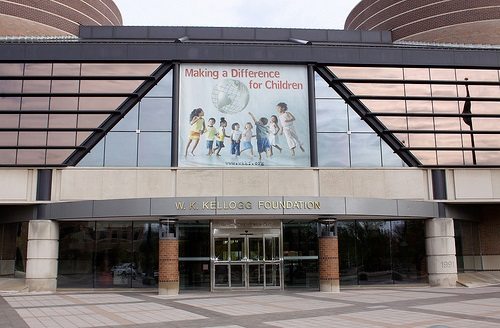
October 4, 2014; The Root
The W.K. Kellogg Foundation (WKKF) may be the largest and most visible national foundation with a significant program dedicated to addressing the problems of race. The Racial Healing program of the W.K. Kellogg Foundation isn’t just a limited, delineated program, but a major effort that appears to have become a lens in all of the foundation’s grantmaking efforts. Kellogg vice president Gail Christopher has led the program for several years.
Gail Christopher spoke last month at the Advancing Justice Conference in Washington and answered questions for Breanna Edwards from The Root. We also spoke to Christopher last year for a publication of the Philanthropic Initiative for Racial Equity in which we examined the thinking of several foundation leaders including Christopher’s peers at the Ford Foundation (Maya Harris), the Silicon Valley Foundation (Emmett Carson), the C.S. Mott Foundation (Kimberly Roberson), and the Mary Reynolds Babcock Foundation (Gladys Washington), just to name a few. The name of the program, “Racial Healing,” and its focus, in Christopher’s words, on “the systemic and structural manifestations that help reinforce the country’s contentious racial history,” appear at first blush a little contradictory, except that Christopher explains that acknowledgement of that history is a crucial step.
“Our approach to [racism] is to focus on the structural manifestations of [our racialized beginnings and our racialized culture], but also to facilitate the personal, individual, collective and group development and growth that’s required for developing the willingness to deal with these issues, which are easier to not deal with for most people,” Christopher told The Root. “We fund advocacy, we fund community organizing, we fund policy research, but we also fund healing, racial healing, and the necessary interpersonal work, and the relationship and the trust-building activities that have to happen at the level of communities and organizations.”
Sign up for our free newsletters
Subscribe to NPQ's newsletters to have our top stories delivered directly to your inbox.
By signing up, you agree to our privacy policy and terms of use, and to receive messages from NPQ and our partners.
What do Kellogg’s Racial Healing grantees do? “Our collection of grantees—more than 500 of them around the country—they’re trying to engage local communities and authorities in the processes of understanding that history and putting in practices and behaviors and tools and resources to mitigate the natural inclination to…maintain and perpetuate those oppressive behaviors,” Christopher added. “Unconscious bias comes into play, as well as very complicated psychological responses that are part of the way we’ve been socialized. And certainly the legal and authority systems have been socialized to play out our racist ideology that is so part of our DNA as a country.”
Describing the dynamics of racial equity is now a regular part of philanthropic and even societal discourse. What’s not very clear is what might be done to effectively address the manifestations of structural racism and, especially, why more foundations haven’t launched major programs tackling issues of race. “Boards need to be more diverse; and once they are diverse, they need to learn how to deal with it and the conscious and unconscious biases they are going to bring,” Christopher explained. “The model of philanthropy is not one that lends itself easily to equity, or racial equity.”
That may be the challenge: figuring out how to adapt philanthropy, hardly an instrument of democracy and racial justice in its history, to effectively work against structural racism. Christopher told us in her interview for the PRE report that on race, philanthropy is “light years” beyond where it was only a couple of decades ago, but foundations still tend to address race indirectly. Like nearly everyone interviewed for the PRE report, Christopher suggested that philanthropic action on race depended on the foundations’ leadership, but the same applies beyond philanthropy.
In the way that eradicating racism has to be accomplished by addressing both explicit and hidden racism, conscious and unconscious racism, constructing effective philanthropic programs against racism requires, according to the California Endowment’s Ray Colmenar, “integrating racial justice as a core value and principle across an entire organization.” That seems to be what Kellogg has attempted to do in its Racial Healing program.
In the end, what eludes us is what a foundation concretely does to address structural racism and whether “healing” is really the precise term or frame to use. There is no shortage of national and international publications and convenings on structural racism, but much less in the way of concrete actions supported by philanthropic dollars that communities can take against institutional or structural racism. Very rarely do we see anything like the program of the City of Seattle, the Race and Social Justice Initiative, which developed a three-year plan under city auspices with explicit goals to be achieved in the city’s internal governmental operations, its public engagements and provision of services, and its impact on reducing racial and ethnic disparities.
Notwithstanding the variety of conferences and reports that seem to be one of the favorite foundation products on racism, the Seattle program, connected structurally to city government, seems pragmatic and focused on doing something real. The former director of the Seattle program, Glenn Harris, has moved on to head the Center for Social Inclusion, whose well recognized former CEO is now working for the administration of NYC Mayor Bill de Blasio. In a program in Madison, Wisconsin, Harris described some of the concrete, pragmatic actions that Seattle took specifically to undo racial impediments in city processes. The evidence of success of the initiative isn’t clear, mostly in recounting actions taken to address racial disparities in juvenile justice, but give Seattle credit: It is doing something, taking specific actions, and looking for changes. Doesn’t it seem like foundations could be supporting initiatives like Seattle’s and really make progress, even if small, toward “racial healing?”—Rick Cohen










